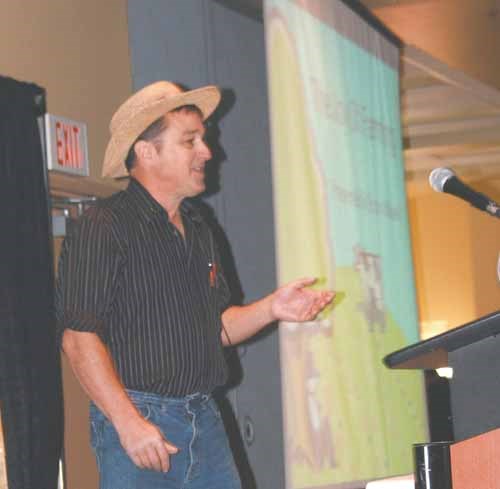"Hello. My name is Bruno and I'm a compulsive gambler. - I'm a farmer."
So started the keynote presentation by Bruno Wiskell at this year's Saskatchewan Canola Expo held in Yorkton Wednesday as part of the Grain Millers Harvest Showdown.
Wiskell said farming, like any other career choice, must be one where you are happy, otherwise why take on the risks associated with it.
But if you enjoy farming then there are great opportunities to explore, said Wiskell.
In his own case Wiskell had ties to the farm, but grew up in the city.
"My grandfather started farming in 1938," stated the Alberta farmer, adding he was "born and raised in Edmonton.
"Until I was 15 I didn't have too much to do with farming."
But when Wiskell was 15 his grandfather died, and his father quit his city job to return to the farm.
"When I got to the farm I knew it was what I wanted to do with the rest of my life," he said.
Wiskell said the farm was a place which had freedom, the outdoors, and an opportunity for knowledge, all things which appealed to him.
However, Wiskell would not see eye-to-eye with his father on things on the farm, so chose to take a path in business, becoming a geologist, and a successful one with a Calgary office and secretary.
"I hated my job. I did not like being in that little box," he said, adding he was becoming what he termed a 'calender counter' a syndrome where people count the days until they can start living the life they really want.
Wiskell said he remembered looking out his office window at a crew planting flowers in Calgary.
"I wanted to be out there with my hands in the soil," he said.
Then oil prices crashed, and Wiskell was let go.
So at the age of 28, he bought a farm.
"I started out with no money, struggling to make ends meet," said the now 51-year-old. His first tractor was a 1965 45 horsepower International, his first combine a 1974 IH 815.
What Wiskell said he did have though was a willingness to experiment and try new ways of increasing the returns from the farm.
"Through the smallest windows sometimes you see the biggest opportunities," he said.
Not that every experiment worked.
Wiskell said there was the time experts were talking of an aging population wanting smaller cuts of beef. So he crossed Jersey and Dexter to achieve the smaller cuts, but at the auction mart no one wanted the small calves.
"It didn't work out but it's not a big deal. It's about trying things out," he said. " Not only do I look at things differently, I look at different things."
Wiskell said in looking at different things he was seeking greater control of returns on the farm. He said his father was always watching, the skies for weather, and the papers in terms of commodity prices,
"I want to control the weather and I want to control the price," he said.
Over the years Wiskell has tried, and been successful, at varied enterprises. He sold cow manure as fertilizer, garnering "three times as much on the manure as the cattle." He cut trees to make lumber, but found greater profit in selling firewood, and eventually in selling wood chips. He has grown pumpkins, grapes, and started a rose garden to attract tourists.
"We sell everything on emotion," he said, adding when you market something as a commodity "somebody else sets the price."
That is why Wiskell said he grows no canola or cereal crops.
When he started growing pumpkins he was the lone grower in the county.
"Guess what we could charge for our pumpkins? Anything we wanted," said Wiskell.
It is the same for bus tours now visiting their gardens. Wiskell said the idea came from visiting the Butchart Gardens near Victoria where admission is $25 and tea and crumpets is $35. When he returned home he started building his gardens.
"You build it, they will come," he said, adding in 2010 they had 17 bus tours visit.
Wiskell said by trying a range of things he has built in protection from the full effects of floods, droughts, tornadoes, or other disasters.
"We're so diversified we have not taken a hit that has knocked us off our feet yet," he said.



